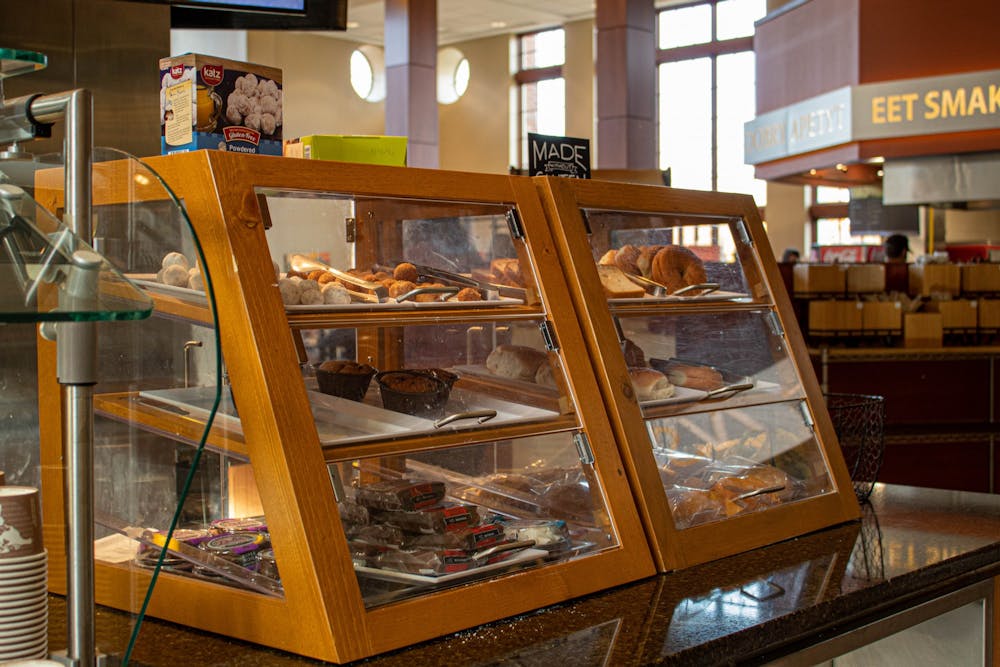Editor's note: The original version of this story did not properly and factually represent the issue of gluten-free options on campus. The elements have since been removed and the remainder of the article verified. Additional interviews were added to the article, as well.
Lila Hoffman-Byer has an intolerance to gluten. The Elon University sophomore said she struggles finding gluten-free options that she likes in the dining halls across campus, and when she asks the dining staff if the food being served is gluten free, the staff is not always attentive to her needs.
“Sometimes I’ll say to one of the workers there, ‘Oh, I’m gluten free. Is this fine?,” Hoffman-Byer said. “That just first off shows that they aren’t really given the proper training to know how to deal with people who are gluten-free.”
Similarly, sophomore Holly Becker has celiac disease, an autoimmune disorder that causes inflammation after ingesting gluten, and said she believes there needs to be more options and more effort to prevent cross contamination.
“Lakeside is really good — like packaged desserts, and packaged bread and stuff — and McEwen has packaged bread too, which is really good,” Becker said. “It’s still kind of a struggle, at least at McEwen, there’s not that many options. They have gluten-free bread and stuff, but the fryers and stuff are still cross-contaminated.”
Elon Dining Guest Experience Manager Casey Claflin, in a joint email statement to Elon News Network with university dietician Whitney Self, wrote that all of Elon’s dining halls offer gluten-free options and update their menus each week so students with dietary restrictions still have a variety of offerings. Claflin and Self both declined in-person interviews.
“I meet with students individually to help them navigate on-campus dining options and use our website to find options made without gluten,” Self wrote. “I manage our recipe and ingredient database and ensure that allergens are correctly flagged on our website and the digital menu boards.”
While Claflin wrote the dining hall works hard to provide options for the students, some are still not satisfied with the efforts and options provided. Hoffman-Byer said she feels most comfortable with the packaged items, but she does not like the options the dining hall offers.
“The only things I feel really, fully comfortable with are the packaged stuff, and they’re not healthy at all,” Hoffman-Byer said.
Dining hall duties
Clafin and Self wrote the main priority for dining staff is to ensure the safety of students. The pair also wrote that the dining team is trained to avoid any cross-contamination by keeping the area clean and changing utensils frequently.
“Our teams are trained to avoid cross contamination with products that contain gluten by washing hands, changing gloves and aprons, sanitizing work areas, and using non-contaminated cutting boards and cooking implements when preparing items that are made without gluten,” Claflin and Self wrote.
What it takes to be gluten-free
Claflin wrote gluten-free products are sourced by Elon Dining and packaged in a different location, and chefs and registered dietitians also work to create menus that don’t include gluten. Claflin and Self also stated the gluten-free items are highlighted on the menu everyday.
The Elon dining team works to ensure students can stay safe, enjoy their favorite foods and enter the dining hall stress-free about their dietary restrictions, according to Claflin.
“Our teams take the utmost caution to avoid any cross-contamination when making dishes made without gluten dishes, but these items have not been certified as Gluten Free because of the flour that could be in the air,” Claflin wrote.
Claflin wrote that in order for something to be a certified gluten-free product, it must pass the per parts million test, which is used to describe low concentrations of an ingredient, and come pre-packaged to avoid any outside contamination.
According to Claflin, Elon Dining gets its desserts and other food items from separate food facilities so students can have access to certified gluten-free products made in a facility that does not use gluten.
Changes in the dining halls
Hoffman-Byer said she hopes to see some change and suggested there should be a gluten-free section in some of the dining halls.
“I think it would be great to have a dining hall, or just half the dining hall, designated to be gluten free just because people then might be safer,” Hoffman-byer said.
Although she is dissatisfied with the array of options in the dining hall, Hoffman-Byer said she does like Clohan Dining Hall because of the sandwich bar, which offers gluten-free bread.
Becker said she hopes to see some changes in the dining hall, too.
“I would say a separate fryer, so they aren’t frying breaded stuff like french fries,” Becker said. “More lunch options too, I think.”
Claflin and Self both wrote that Elon Dining will continue expanding the allergen-free recipes on campus, like at the True Balance Station in Lakeside Dining Hall, which features made-without-gluten recipes.
Becker said she also thinks it would be beneficial not just to create more food options, but also make some of the staff more aware of different allergies, so they can be more attentive to the students’ needs.
“I feel like it would not be a waste of time, making it more known and stuff for the faculty,” Becker said.
Self wrote she uses feedback from students and the culinary council to see if more options can be put into the dining halls for students. The pop-ups that Elon Dining hosts around campus also include gluten-free substitutes, so the events can be inclusive to the whole Elon community, according to Self.
Self wrote that she and other dining staff are always looking for feedback to improve students' dining hall experience and be more inclusive to all needs.
“I gather feedback from individual students and from our student culinary council,” Self wrote. “We always welcome feedback from our community!”


